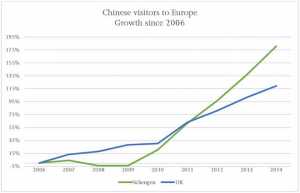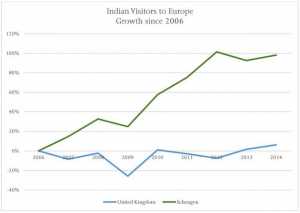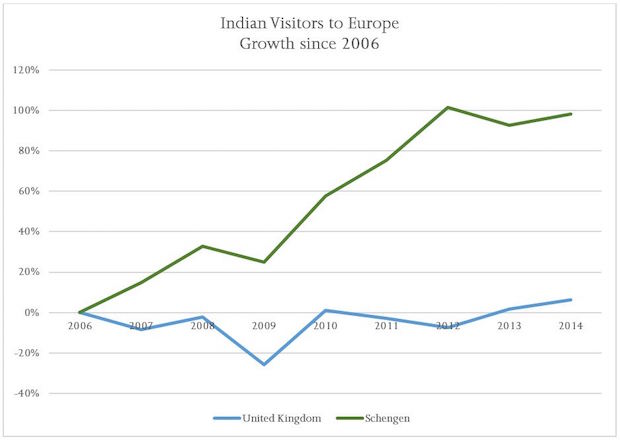
 The Schengen Agreement has come under a lot of scrutiny, particularly with reference to the freedom with which people can move around within Europe. It is widely portrayed as “broken” and simultaneously “about to fail”.
The Schengen Agreement has come under a lot of scrutiny, particularly with reference to the freedom with which people can move around within Europe. It is widely portrayed as “broken” and simultaneously “about to fail”.
But one, unremarked, area where the Schengen agreement has been of huge benefit is in the provision of a single visa for travellers coming to Europe.
Prior to this anyone coming from a country requiring a visa was required to obtain separate visas for each country visited. This came at a considerable cost in terms of money and time. The advent of the single visa in 1995 changed this: one visa was needed from the entry country, and one fee paid.
The impact on demand was felt almost immediately: Italy, Germany and the Netherlands showed high double digit growth in the late-1990s through to the mid-2000s. What is interesting is that the benefits of this policy have been continual. This is evident: the UK, having its own visa regime, provides a yardstick.
Source UNWTO. Schengen data is taken from data provided by France, Germany, Italy, Spain and Switzerland.
The comparative performance with China, shows that Schengen has outperformed the UK posting nearly double the growth since 2006. This more than compensates for the dip in the period 2007-9. The sample period disguises the huge growth posted by Schengen countries prior to 2006. This has led to a major disparity in the number of visitors between Schengen and the non-Schengen sample: in 2014 France declared 1.6 million Chinese visitors, Germany 1.1 million, Italy 2.3 million; in that year the UK received 185,000.
Source UNWTO. Schengen data is taken from data provided by Belgium, Germany, Italy, Netherlands and Switzerland.
What is clear is that being in Schengen enables a country to draw on the attraction of its neighbours. The UK has seen tourism arrivals from India roughly double since 1998; Belgium has seen them grow by five and a half times and Switzerland by four times in the same period.
“Before the advent of the Schengen agreement, any Indian planning to go on a pan-European vacation was confronted with formidable bureaucratic obstacles,” said Karan Anand, Chairman of the Outbound Committee of the Indian Association of Tour Operators. “As it took up to six weeks to apply for a visa, it was not impossible for customers to have to go through six months of applications in order to have a visit. Schengen has thus been an enormous improvement. We are now can sell tours featuring the places that our clients want to visit in a way which was impossible.”
“Even today the challenge before us is to manage demand as the number of Indians visiting the Schengen area is growing by at least 25 per cent year on year. The Schengen agreement is a boon for travellers.”
The Schengen visa is three pages long, gives access to twenty seven countries and costs €60. The UK is twelve pages long gives access to two countries and costs £87. The UK visa requires everyone to list all international journeys over the last ten years, stating duration and purpose. It asks such questions as: “Have you ever, by any means or medium, expressed views that justify or glorify terrorist violence or that may encourage others to terrorist acts or other serious criminal acts? Have you engaged in any other activities that might indicate that you may not be considered a person of good character?”
“Whatever difficulties are faced by the Common Travel Area, the Schengen Visa has been a big success”, said Tom Jenkins, CEO of ETOA. “Millions of additional visitors have come to Europe, spending billions of Euros, and creating tens of thousands of jobs. It shows how well Europe can work.”
“This is perfect example of comparative bureaucracy. I was once informed, by a senior Border Agency official, that people would be attracted to the UK when they saw how seriously we took our visas. He was projecting his own pride in paperwork onto the customers. Alas, form filling has proved to be a niche product with limited appeal.”
“The decision to stay outside of Schengen was always going to be expensive. It has probably cost the UK a cumulative total of 20 million visitors, at a loss of £26 billion. The UK handling this by itself, free of European ‘meddling’, has been an export catastrophe.”












